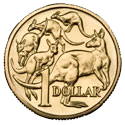Australian one-dollar coin
Australia | |
| Value | 1.00 AUD |
|---|---|
| Mass | 9.00 g |
| Diameter | 25.00 mm |
| Thickness | 3.00 mm |
| Edge | interrupted milled 0.25 mm 77 notches |
| Composition | 92% Copper, 6% Aluminium, 2% Nickel |
| Years of minting | 1984–present |
| Catalog number | — |
| Obverse | |
| Design | Elizabeth II, Queen of Australia |
| Designer | Ian Rank-Broadley |
| Design date | 1999 |
| Reverse | |
 | |
| Design | Five kangaroos |
| Designer | Stuart Devlin |
| Design date | 1983 |
The Australian one dollar coin is the second-most-valuable circulation denomination coin of the Australian dollar after the two-dollar coin; there are also non-circulating legal-tender coins of higher denominations (five-, ten-, two-hundred-dollar coins[1] and the one-million-dollar coin[2]).
It was first issued on 14 May 1984[3] to replace the one-dollar note which was then in circulation, although plans to introduce a dollar coin had existed since the mid-1970s.[3] The first year of minting saw 186.3 million of the coins produced at the Royal Australian Mint in Canberra.[3]
Three portraits of Queen Elizabeth II have featured on the obverse, the 1984 head of Queen Elizabeth II by Arnold Machin; between 1985 and 1998 the head by Raphael Maklouf; and since 1999 the head by Ian Rank-Broadley. The coin features an inscription on its obverse of AUSTRALIA on the right-hand side and ELIZABETH II on the left-hand side.
The reverse features five kangaroos. The image was designed by Stuart Devlin, who designed Australia's first decimal coins in 1966.
The $1 was only issued in coin sets in 1987, 1989, 1990, 1991, 1992, and finally, 2012. No $1 with any mint mark was ever released for circulation, any dollars found with such mark comes for a card.
The one dollar and two dollar coins are legal tender up to the sum of not exceeding 10 times the face value of the coin concerned.[4]
Commemorative issue
The Royal Australian Mint has released a number of commemorative issued coins since the Australian $1 was released in 1984, some of which were not released into circulation.
| Year | Subject | Mintage | |
|---|---|---|---|
| 1986 | International Year of Peace | 25,200,000 | |
| 1988 | Commemoration the Australian Bicentennial | 21,600,000 | |
| 1993 | Landcare Australia | 18,200,000 | |
| 1996 | Sir Henry Parkes | 26,200,000 | |
| 1997 | Birth of Sir Charles Kingsford-Smith | 24,400,000 | |
| 1999 | International Year of Older Persons | 29,300,000 | |
| 2001 | Centenary of Federation | 27,900,000 | |
| International Year of Volunteers | 6,000,000 | ||
| 2002 | Year of the Outback | 35,400,000 | |
| 2003 | Australia's Volunteers | 4,100,000 | |
| Centenary of Women's Suffrage | 10,000,000 | ||
| 2005 | 60th Anniversary of the End of World War II | 34,200,000 | |
| 2007 | Australia's hosting of the Asia-Pacific Economic Cooperation Forum | 20,100,000 | |
| 2008 | Centenary of Scouting in Australia | 17,200,000 | |
| 2009 | 100th Year of the Age Pension | 21,300,000 | |
| 2010 | Centenary of Girl Guiding in Australia | 12,600,000 | |
| 2011 | Commonwealth Heads of Government Meeting | 9,400,000 | |
| 2014 - 2018 |
Centenary of ANZAC 2014-2018 | 21,800,000 (2014) 1,300,000 (2015) 1,800,000* (2016) | |
| 2016 | 50th Anniversary of Decimal Currency | 300,000* | |
| "*" denotes partial numbers for 2016 - total production to be confirmed | |||
| References:[5] | |||
See also
References
Citations
- ^ "$200 Gold coin".
- ^ "$1 million coin minted". smh.com.au. 28 October 2011. Retrieved 18 November 2016.
- ^ a b c "One dollar". Royal Australian Mint. 14 May 1984. Retrieved 28 November 2016.
- ^ "RBA Banknotes: Legal Tender". banknotes.rba.gov.au. Retrieved 24 July 2018.
- ^ "One Dollar". Royal Australian Mint. 8 January 2016. Retrieved 29 September 2017.
Sources
- Pitt, Ian W., ed. (2000). Renniks Australian Coin and Banknote Values (19th ed.). Chippendale, NSW: Renniks Publications. ISBN 0-9585574-4-6.
